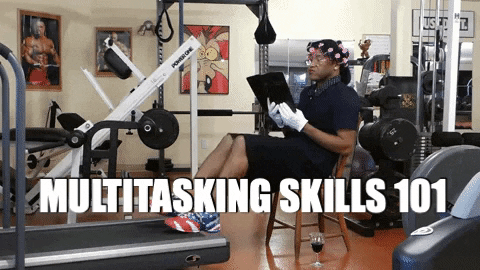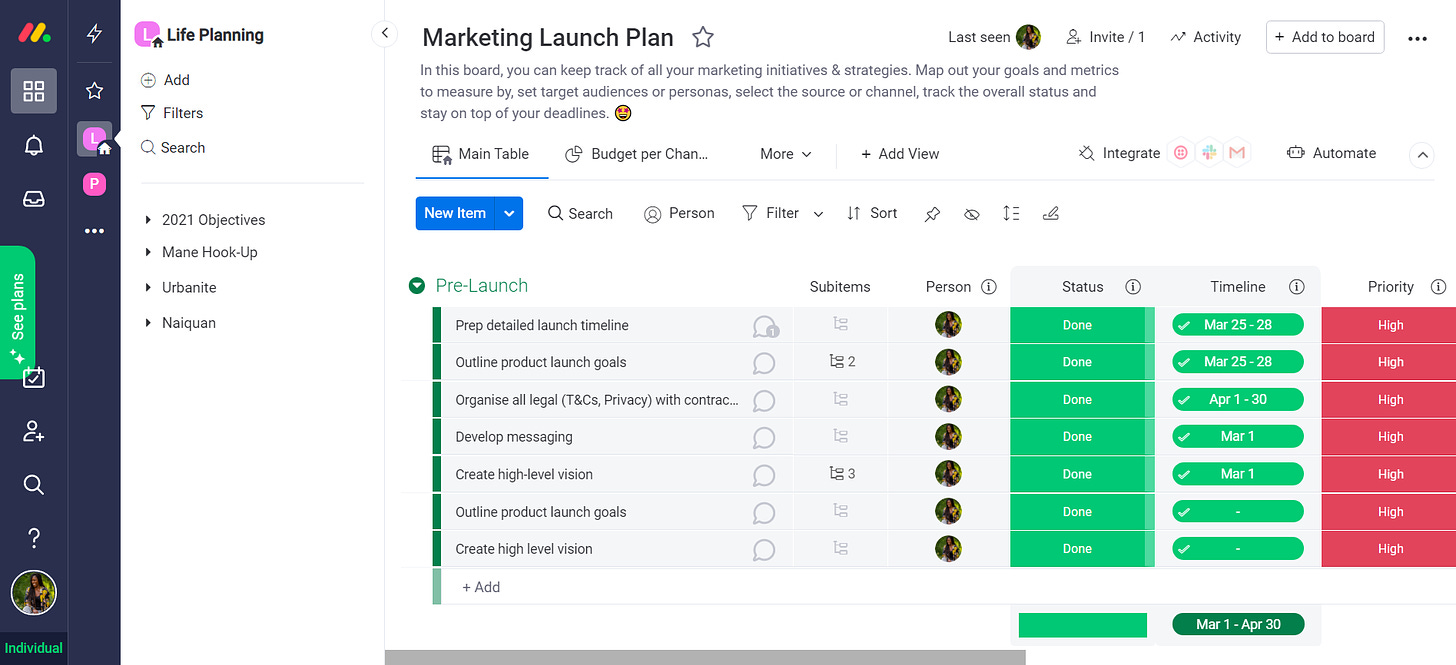Setting yourself up for success as a part-time founder
📔 LESSON OF THE WEEK
Setting yourself up for success as a part-time founder
There are many founders who work part-time while running their own business. And yet, this is rarely spoken about.
What’s often painted is an ‘all or nothing’ picture of the founder who gives up everything to run their business full-time. To do this you ideally need to have the financial means (i.e. savings, family support, a significant other), to not hold many responsibilities that could de-rail you (hello mortgage and student loans 👋🏾) or be responsible for vulnerable people/children whose lives could be made unstable in the process.
It’s fair to say that working on your business full-time — at the very beginning of your journey — is a luxury that not everyone can afford. So finding a part-time job, that also allows you to dedicate a reasonable amount of time to growing and establishing your business, is a much more viable option. Giving you a chance to dip your toe into the water first before jumping in with both feet.
For full disclosure, this is an important topic to me as I’ve only ever worked part-time. From my very first marketing role to the most senior one that I currently hold, I have laid the foundations of my career while working part-time to make sure I can pursue other things that are an integral part of my life. Doing so has forced me to learn how to adapt and quickly…
But I’ve also had to stumble, fall and learn some essential lessons about being a part-time founder. All of which I wish I had known at the beginning of my journey, not just to make life easier, but to also have confidence that my experience is perfectly normal and that my chances of success are not minimised just because my current situation doesn’t permit me to work on Mane Hook-Up all the time.
So, while working on your business full-time may be the long-term objective, there is nothing wrong with looking for part-time work that can accommodate your needs for now. For all of you who are in this position, here are some tips to help you to create a routine that sets you up for success…
LESSON 1️⃣ Design your ideal situation taking time, salary and location into consideration: getting a part-time role that offers the flexibility and support that you need, can only happen when you’ve decided exactly what your ideal situation looks like.
This is pretty critical as you have to be prepared to negotiate your terms when there’s an offer on the table. Here are the key things that you need to consider while building a business and looking for part-time work:
📅 Your timetable: think, how many hours a week do you need to dedicate to your business in order to facilitate growth? You need to do more than just keep the lights on because doing that alone will keep you stuck in limbo (e.g. always working part-time). Think about the business objectives you’ve set for the next 12 months, plot out your time and decide what the absolute minimum is a week. I dedicate around 15 hours a week to my businesses and — albeit with a strict timetable — this has allowed me to launch new products, form partnerships and much more. Mapping it out in a calendar also helps as you can visualise what a typical week looks like. Then you’ll end up with something like this…
Strategically planning your time will help you to understand how many hours a week you can afford to work part-time. For example, if a typical working week is 40-45 hours and I need to spend 15 hours on Mane Hook-Up, that leaves me with 25-30 hours a week to commit to a job.
This is where things like flexible working hours and adjusted start/end times can be really valuable. For example, Thursday is the only day that I start work at 9 am — for the rest of the week, I start anywhere between 10 am and 1 pm. A delayed start gives me precious daylight hours to get as much work done as possible, while my energy levels are high. But this set-up wasn’t offered to me directly, I’ve always had to ask and negotiate these terms. So, when you’re speaking to businesses, always bring flexible working up, letting them know exactly when you want while reassuring them that you’re capable of getting the job done.💰 How much money you need: you have a life to lead, bills to pay and a business to invest in. This means landing a salary that can support the non-negotiable financial commitments that you have. Taking the time to evaluate your expenses is key — that way you’ll know how much you need to earn in order to make this work. Budgeting tools like the Money Advice Services budget planner are a great place to start. Give this a go and see what your average monthly expenses look like.
Also remember that working part-time means that your salary will be pro-rata — which is just a fancy way of saying, you get the part-time equivalent of the full-time pay. Here’s an example to make this sound less confusing, imagine the full-time role is £30k a year and you’re working 80% of those hours. You’ll then get 80% of the pay — aka. £24k. Knowing this also puts you in a position to find roles and businesses that can afford to pay your base salary, and save you a lot of time. After all, you don’t want to apply for roles with salaries that are miles beneath what you need. This pro-rata calculator has been my go-to for years, helping me to understand what take-home pay looks like after taxes, student loans and national insurance.
Bear in mind, there are a lot of factors that influence the salary of the role (think location, seniority and the stage the business is in). So do your due diligence to get a clear view of your financial situation from the get-go.💡 The role, company or project: If you’re going to be dedicating part of your time to another business, consider what you’re getting from this experience. What do you need to learn? Does their end goal excite you enough? Do you have enough autonomy? All of these factors will influence how you feel while you’re helping someone else to build their dream and ultimately, it will need to be fulfilling to feel worthwhile. Personally, I need to have faith in the product and believe in the company’s mission statement to be onboard. That gives me the energy I need to do my best in the hours that I’m there.
But remember that this is more than just a means of making ends meet until you have the opportunity to work on your business full-time. You have a chance to build up your skill-set and really get to grips with what it means to run a business by learning from the people around you. Use this time to your advantage and aim to learn as much as you can.
Key takeaway: being a part-time founder with a job means finding a role that suits your situation. To do that, you need to have a very clear very vision and that starts with mapping out exactly what that looks like. Give yourself the time to do the necessary research, it will pay off in the end.
LESSON 2️⃣ Be prepared to negotiate: There are two things that used to drive me insane🤯 when I was searching for work:
The sheer lack of part-time work out there. Not many companies realise that flexible working tends to make people more productive and less likely to take time off work. Even though we’re in 2021, full-time hours are unfortunately still the standard for most roles.
With a few years of experience under my belt, I’ve realised that most businesses are very much stuck in their ways. And, if you lead with, “love the sound of this role, but I’d like to work part-time”, you’re likely to get a polite no or no reply at all.
To help navigate through this minefield (and keep my sanity 🤦🏾), I developed a three-part plan to create the outcome that I wanted. As I mentioned before, all of my roles have been part-time so I’d like to think it works. And hopefully, these steps will help you too:
Apply for full-time jobs: opting for ‘ask for forgiveness, not permission’, I just applied for any role that struck a chord with me with the aim of wooing them in the interview. This allowed me to cast a wider net, and find opportunities that otherwise would have been missed. Having built teams in the past (yup, while working part-time ⏰), I know that people buy into people. And if a business honestly believes that you have the ability to help them to grow, they will happily consider your terms.
Only mention part-time work on receiving an offer: when someone wants you to work for them, they are likely to find flexibility in their thinking that just wasn’t there before. I found that mentioning part-time hours after receiving an offer, sparked a stream of conversations about my other commitments — they were typically quite helpful and gave companies an opportunity to think about whether they really needed someone full-time.
Understand what you need to make your situation work and be ready to negotiate: instinctively, most people will ask why you want to work part-time so preparing a solid answer helps. But more than that, articulating the level of flexibility that you need (down to the exact hours you’d like to work) provides both parties with clarity. All of the job offers I’ve received were advertised as full-time roles initially. And I honestly believe that coming to each business with a clear plan helped me to negotiate the terms that worked for me.
Key takeaway: negotiation is a craft and you need to be able to flex this muscle if your aim is to work part-time while building your business. Be prepared, put in the work and you are more likely to walk away with an offer that fits your expectations.
LESSON 3️⃣ Take ownership of all your choices: reading The Compound Effect changed the way that I manage myself as a part-time founder. More than anything, it taught me that I always have a choice. It’s very easy, especially during challenging times, to simply say “that’s just how it is” or “I can’t change that”. And, as a result, we tend to go into auto-pilot, maintaining habits that take us further and further away from our goals and ambitions. The Compound Effect shook this out of my system by making it explicitly clear that I am responsible for each and every one of my choices.
From the time that you wake up to the food that you eat and the people you choose to keep in your life, it’s important to remember that you are far more in control than you think. Taking ownership of all of your choices means taking control of each outcome. So, everything that I do, comes with a trade-off, for example:
📺 Staying up too late and binge-watching Netflix = waking up late and losing 2 hours on potential business planning.
📧 Procrastinating and not replying to potential clients fast enough = losing a lead and having to put extra hours into finding the next one.
🤔 Not thinking ahead and lacking strategic objectives = not moving fast enough and being overtaken by the competition.
Lack of ownership and responsibility ultimately does more harm than good as it means you miss out on opportunities to lay strong, positive, foundations for your businesses. When I reflect on my routine before taking full responsibility for my choices, I was often:
Working ungodly hours — meaning, I was burning the candle at both ends and in the middle 🕯️. With an objective of working 15 hours a week, I was literally doing that in any way possible and not optimising my productivity. In other words, not enough work being done and burnout was pending.
Missing important targets and deadlines — because that’s not really possible when your time isn’t planned (or poorly planned). The art of being a part-time founder is in managing yourself effectively.
Feeling stressed and anxious — being a founder isn’t always rainbows and unicorns, but ultimately your business should bring you joy. That wasn’t always the case as I felt that I didn’t have enough time to get things done. All the things + not enough time = stress 👇🏾
The problem is rarely how much time you have, instead, it’s about what you choose to do with that time. Fast-forward several months later, where I now take full responsibility for any outcome, take all of my choices seriously (they all add up in the end) and use setbacks as a learning opportunity, and my working life is very different:
Working at hours of peak focus — now I produce work of higher quality in a shorter period of time. Also, knowing when I’m most productive in the day allowed me to channel energy into the important tasks at the right moment.
Setting realistic goals and deadlines as a guide — the ultimate win, setting challenging objectives to be completed in reasonable timelines. With more headspace to think, I can clearly forecast and create accurate projections that leave me feeling more hopeful than stressed.
Energy and drive were restored — working on my business feels more enjoyable with this sense of structure. I start each day knowing how it contributes to my week, month and quarter. Instead of feeling cornered, I now feel empowered.
If you want to get a quick overview of some of the lessons Darren Hardy shares in The Compound Effect, take a look at this recap. I still highly recommend that you read the book (or listen to it on Audible) as it played a huge role in re-framing how I viewed my ability to take control of my time.
Key takeaway: By planning your time, you have to consciously choose each step that you take. And that is far more empowering than simply letting life happen to you. As a part-time founder, you don’t have time to waste. Use it wisely by making choices that nudge you forwards.
LESSON 4️⃣ Don’t let what other people say/do derail you: unfortunately, one of the many things that founders are on the receiving end of is doubt from others. But it’s important to remember that few people choose to start their own business. As you’re going down a path that is rarely trodden, you have to be prepared to do things that few would. Like working part-time, waking up at 5 am to get some planning done or choosing to invest in your business before taking a three week holiday.
But you’re human and naturally, a constant barrage of doubt from others can take its toll. While we dream of everyone we know being supportive and cheering us on at the sidelines, that isn’t always the case. It pays to remember:
Not everyone will see your vision and that’s OK. Some things are for your eyes only 👀
Not everyone has dreams as big as yours — some might say it’s impossible but remember that only you can put a limit on your abilities.
Key takeaway: we all need support — surround yourself with people who want to see you win. And when someone doubts you, remember that it’s a reflection of their limitations, not yours.
📧 Was this email forwarded to you? Sign up below to get the next one sent to you.
💛FOUNDER CARE
The importance of saying ‘no’ (and why healthy boundaries are necessary)
Wanting to help others is a wonderful quality to have. But, when this is coupled with a lack of boundaries (aka, the inability to say no) it’s a slippery slope and often leads to people losing precious time that should be spent on themselves. After all, there are times that you just need to put yourself first.
I often used to make more promises than I should help others. Leaving me with far too many things to do and not enough time to do them all. Making this the story of my life 👇🏾
Being over-inundated with requests doesn’t serve you for a few reasons:
Lack of time increases the chances of making avoidable mistakes (hello typos❌🖊️) and who needs extra fires to put out?
Being stretched to full capacity compromises the quality of your work (again, typos).
Your time is your currency. It needs to be spent wisely and spreading yourself thin often means important things are de-prioritised.
So, learning how and when to say ‘no’ or ‘not now’ is vital — it helps guide you, prevents burnout and creates healthy boundaries. Saying no lets others know that you can prioritise yourself and that your time is not available on a whim. And that changes the way that you are approached from the get-go. Imagine being given a weeks notice instead of a day or your help being asked for instead of demanded? That is what saying no can do. Remember, you’re important too and saying ‘no’ to others often gives you a chance to say ‘yes’ to yourself.
🧰 FOUNDERS TOOLBOX
As a tool and app junkie, I’m regularly looking for anything that can streamline a process, cut down on time and overall, make my life as a founder easier. For anyone who needs them, here are a few tools that found a special place in my toolbox this week.
Project management bliss with Monday.com
Projects can be a challenge when you’re a team of one and there are a lot of moving parts. Sometimes a to-do list just won’t cut it and you need something to gently guide you towards deadlines and outcomes. For me, Monday.com was the perfect solution. With project templates and boards that can be split into phases with tasks, notes, timelines and objectives, it offers everything that a founder needs to keep track of their many responsibilities.
Website Policies & Termly
With legislation like GDPR in place, having clear and concise terms/conditions and a cookie banner tool is a non-negotiable for anyone who has their own website. Finding someone to draft these terms is no easy feat so my temporary solutions have been using a Website Policy generator to create legal terms (e.g. privacy policy, acceptable use) coupled with Termly’s cookie consent banner which has detailed opt-in/out options. Both aim to help businesses of all kinds create policies that will ultimately protect them and their customers. And, at only $45-$90 a year, both tools are a worthwhile investment.
Remove bg
There’s nothing more annoying than struggling to find images with a clear background 😐. Luckily, I found this hidden gem in a LinkedIn comment last week and I can honestly say that it’s worth its weight in gold. With Remove bg, you can quickly remove backgrounds from images and have a clear PNG in seconds. After creating one image for free, you then have to pay $8 pay as you go to get a set number of pictures a month. Considering how much time it’s saved me, this is well worth the cost.
Help Becoming a Founder to grow by sharing it with a fellow founder or friend 🔥 🔥
🐤 TWEET TIPS
And finally, some advice from the community…

Coming up next time…
And that’s a wrap for this week. Here are some of the things that are coming up next!
Switching developer teams (woo this one was A LOT) 💻
Preparing to launch a brand new SaaS platform 🚀
Finding support without a budget 💰
Forming partnerships with like-minded brands 🤝🏾








